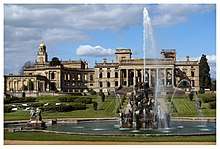Thomas Foley, 1st Baron Foley (1673–1733)
Thomas Foley, 1st Baron Foley FRS (8 November 1673 – 22 January 1733), of Witley Court, Great Witley, Worcestershire, was an English landowner, ironmaster and Tory politician who sat in the English and British House of Commons from 1694 until 1712, when he was raised to the peerage as Baron Foley.

Foley was the eldest son of Thomas Foley and inherited the Great Witley estate on his father's death. His younger brothers were Edward Foley and Richard Foley. He was educated at Sheriffhales academy under John Woodhouse in 1689 and than for some years at Utrecht.[1] He was admitted at Lincoln's Inn on 30 May 1695.[2]
Foley was returned as Member of Parliament for Stafford at a by election on 21 November 1694 followed up by an unopposed return at the 1695 English general election. He was a Commissioner for taking subscriptions to the land bank in 1696. He held the seat at Stafford until 1712 when he was raised to the peerage, as one of 12 peers created on the recommendation of the Lord Treasurer, the Earl of Oxford, to give him a majority in the House of Lords.[1]
Business
When the lease of ironworks at Wilden and Shelsley Walsh expired in 1708, Foley took them in hand and they were operated as an estate enterprise by him and successive owners of the estate until 1776.[3]
Foley was elected a Fellow of the Royal Society in 1696.[4]
Family
Foley married Mary Strode with whom he fathered seven children, five of them predeceasing their parents. His only surviving son was Thomas Foley, 2nd Baron Foley, after whose death the title became extinct, while the estates devolved upon the latter's distant cousin Thomas Foley of Stoke Edith, Herefordshire, for whom the title was revived in 1776.
References
- "FOLEY, Thomas III (1673-1733), of Witley Court, Great Witley, Worcs". History of Parliament Online. Retrieved 25 March 2018.
- Admissions Register VOL 1 1420-1799. The Honourable Society of Lincoln's Inn. 1896.
- The evidence for this is principally that he and his successors purchased pig iron from the blast furnaces of others, and their names thus appear in the furnace accounts.
- "Fellows details". Royal Society. Retrieved 25 March 2018.
- Stuart Handley, 'Foley, Thomas, first Baron Foley (1673–1733)', Oxford Dictionary of National Biography, Oxford University Press, Sept 2004; online edn, Jan 2008 accessed 2 March 2008
- Burkes Peerage.
| Parliament of England | ||
|---|---|---|
| Preceded by John Chetwynd Jonathan Cope |
Member of Parliament for Stafford 1694–1712 With: John Chetwynd 1694–1695, 1701, 1702 Philip Foley 1695–1701 John Pershall 1701–1702 Walter Chetwynd 1702–1707 |
Succeeded by Parliament of Great Britain |
| Preceded by Edward Harley Charles Cocks |
Member of Parliament for Droitwich 1698–1699 With: Charles Cocks |
Succeeded by Charles Cocks Thomas Foley |
| Parliament of Great Britain | ||
| Preceded by Parliament of England |
Member of Parliament for Stafford 1707–1712 With: Walter Chetwynd 1707–1711 Henry Vernon 1711–1712 |
Succeeded by Henry Vernon Walter Chetwynd |
| Peerage of Great Britain | ||
| New creation | Baron Foley 1st creation 1712–1733 |
Succeeded by Thomas Foley |